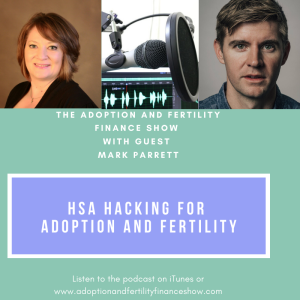
Episodes

Friday Nov 22, 2019
HSA Hacking for Adoption and Fertility- Season 2
Friday Nov 22, 2019
Friday Nov 22, 2019
Laura Coleman from Family Money Coaching and Mark Parrett from Outpost Advisors and Abraham’s Wallet talk about the triple tax-advantages of the Health Savings Account (HSA) on the Adoption and Fertility Finance Show today. Mark is a fee-only financial advisor registered in Utah and Ohio, and he writes about how to run your home and dough like a Biblical boss.
What is a Health Savings Account and How Can I Get One?
Only high deductible health care plans (HDHP) have a health savings account and the criteria is determined by the IRS. From the IRS website: For 2020, the IRS defines a high deductible health plan as any plan with a deductible of at least $1,400 for an individual or $2,800 for a family. An HDHP’s total yearly out-of-pocket expenses (including deductibles, copayments, and coinsurance) can’t be more than $6,900 for an individual or $13,800 for a family. (This limit doesn't apply to out-of-network services.) HSAs help ease the pain of expensive deductibles by letting you pay for medical expenses with untaxed money.
Mark explains a few different ways to use the reimbursement structure so that your money can continue to grow until retirement. You can pay for your expenses out of pocket, invest a portion of your HSA, and then later reimburse yourself with your saved receipts. The triple-tax advantaged part comes when you put money in tax-free, let it grow tax-free, and take it out without paying taxes on it. After you turn 65, you can withdraw it like a 401k for nonmedical expenses, but you will pay taxes then if you use it for that reason.
Maximizing the HSA for Fertility Treatments and Adoption
Laura and Mark discuss how to use the HSA when going through fertility treatments. Mark cautions that state laws can vary on this issue and to pay close attention to what is allowed by law. The maximum amount that can be saved in an HSA is $7,000 [edit: The 2020 IRS guidelines increased this to $7,100 a year. You can use also use a limited use FSA at the same time, but follow the IRS guidelines on this.
Potential Pitfalls in the HSA
Mark talks about the hidden fees that can eat up your HSA’s growth. He explains that often an employer will pay for the fees, and once an employee leaves their old employer, the fees may be transferred over to you. Mark recommends keeping an eye on debit card fees as well. If you are changing employers and would like to change HSA banks, he recommends Fidelity, Ameritrade or any good brokerage company with low or no fees.
Should I Invest My HSA?
Laura and Mark talk about weighing the family’s medical needs with the benefits of the HSA. What’s the goal with your money? Will you need it soon? Can you be comfortable paying out-of-pocket medical costs without being reimbursed? Will you delay going to the doctor
because of the high deductible? Consider these questions when you’re deciding if an HDHP will work for you and when you are deciding to invest your HSA. Some plans have an investment threshold for how much you need to keep in the HSA. Find out what your plan allows.
Where Should I Invest My HSA?
If you don’t understand investing, how do you choose where to put your money? The answer: It depends on your situation. Hourly and fee-based financial planners can help you sit down and make a plan for your future. Fee-based planners help you make decisions that are best for YOU and not what’s best for their bank accounts.
If you loved this podcast, please subscribe and follow us for more conversations about the intersection of adoption, fertility, and finances.
Are you ready to become a forever family? Schedule your 15 minute free no judgement appointment today to talk with Laura about where you’re at in your financial journey, where you’d like to be, and how you’d like to get there.
Links Mentioned in this Podcast
XY Planning Network- Fee-only financial planners
Abraham’s Wallet- Run your home and dough like a Biblical boss
Outpost Advisors- Mark Parrett’s financial planning website
HDHP guidelines from Healthcare.gov
Join our Community on Facebook and share ideas on how to prepare financially for adoption: Paying for Adoption
This episode was sponsored by The Adoption and Fertility Grant Success Course.
So many couples that have started the adoption journey become overwhelmed with the amount of money that they need to save for the process. It can be so discouraging. With knowledge comes power. At Family Money Coaching, we believe in Debt-Free Adoption. That's why we created the Grant Success Course, to help you find, apply, and obtain FREE money. It'll take some work, but you can do it. The worksheets, excel downloads, checklists, and videos in the Grant Success Course will help guide you on what to put in your grant applications. Ideas will be sparked by the questions in the downloadable PDF, success tips with what to look for to find the ideal grant for you, a list of 80 grants for adoption and 20 grants for fertility, a checklist to help you stay on task, and a list of documents needed for application.
There's a bonus Adoption Financial Planner that will provide tracking for your Adoption Budget, the ICPC travel budget, Spending Plan which is needed for the home study and grant, tracking income sources, calendar to help with due dates, budget estimator, and a place for all contacts during the adoption process.

Comments (0)
To leave or reply to comments, please download free Podbean or
No Comments
To leave or reply to comments,
please download free Podbean App.